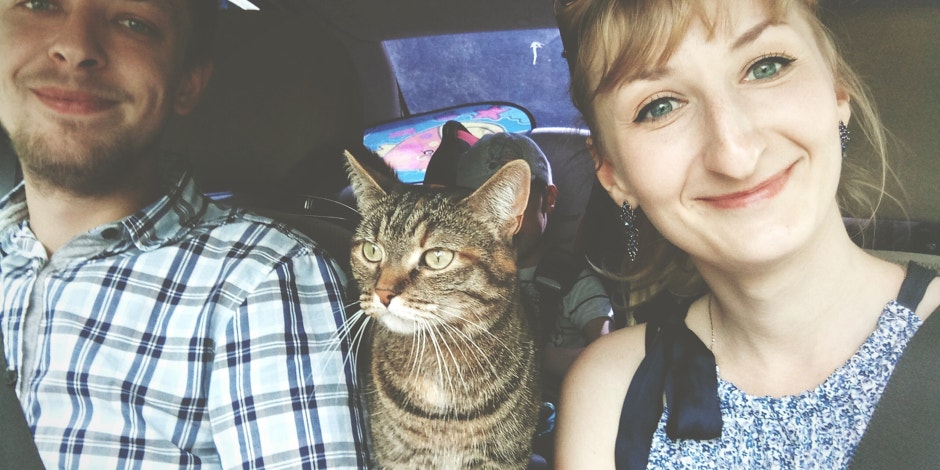The Delight And Wisdom Gleaned From Opening My Home To Cats
It’s hard to explain how kindness manifests itself in a cat.
 Getty
Getty There are actually two foster fathers here. The first is me, an ailurophile with the zeal of an adult convert.
Cats are relative newcomers in my life. I grew up with a dog, Skippy, the world’s smartest, coolest canine--just like, I later learned, everyone else’s. Where I lived, dogs were ubiquitous, cats uncommon.
And the few cats around were dull, uninteresting. They stayed indoors and hid under beds.
Then, when I was 32, I moved to Los Angeles and was lonely, so I took in a cat, Minnie, a thin, highly intelligent tortoiseshell who became my friend and companion for the next 18 years.
We eventually shared five different apartments on two coasts, but she never complained about our peripatetic behavior (except on moving day morning, when she would defecate neatly in the middle of the living room. To me, she was saying: “I don’t like this. Here’s your proof. Now let’s move on.”)
Just shy of her 18th birthday, Minnie fell ill. I canceled one trip so as not to leave her alone but then, in February, I visited a friend in Winnipeg. While there, I learned that Minnie had died. I cried all day.
Note to people who come to Winnipeg in February: If you cry outdoors when the temperature is 40 below zero, your tears freeze on your cheeks--a cold string of itchy, icy dots.
My Winnipeg friend is a large-animal veterinarian who worked as a volunteer for the local Humane Society. Winnipeg’s climate is brutal on cats. Several thousands are put down each year. These cats are stored in cages along what was essentially a Wall of Death. However, occasionally there’s a cat who is so lively, pretty, or smart that he or she is saved.
Right after Minnie died, my friend noticed a 5-month-old kitten who would thrust his paw out of his cage whenever he spotted a potential playmate. The cat, Gus, had such an endearing personality that my friend decided he and I were an ideal match.
Gus was soon shipped off to New York via plane. I met him for the first time at La Guardia. He was in better spirits than most people traveling that day.
Gus, now 10 years old, is beloved by all, not for being particularly smart or athletic or interesting, but for being nice. It’s hard to explain how that manifests itself in a cat. Niceness. You have to experience it to understand it.
I didn’t fully get it until I began working with Ready For Rescue, a remarkable operation run by a man named Doug Halsey. Doug is an creative director in digital media, but much of his day consists of finding out which animals are going to be put down in the city shelter system, swooping in, taking them, finding them foster homes, and eventually placing them in permanent ones.
I’ve now been fostering cats for a year. These discarded felines are often socially maladapted, frightened, or just weird. Some are also lovely, such as Clio, a sweet 1-year-old tabby. It took her a while to warm up to her foster home, and she was terrified of Gus. But I noticed that at some point, perhaps two weeks into her stay, her attitude changed, and she developed a crush on him.
She’d watch him walk past with gooey eyes, and then delicately sniff his butt, bliss then settling onto her face.
This was the pattern. All the cats who showed up disliked, feared, or were hostile toward Gus. Gus was always patient. He seemed to know that, eventually, they’d come around. They all did.
I discovered how and why via Dora, a 5-year-old tabby abandoned by her previous owner. Dora was one of the more troubled cats — one moment she was lying on my stomach, a purring mound of fur, and then suddenly she’d hiss, jump into the air and sprint, screeching, from the room.
Her behavior with Gus was equally unnerving: He’d be sleeping quietly while she sat a few feet from his head, sending him hateful glances. Every now and then she’d whack him. This went on long enough that I wondered if this was one cat Gus couldn’t win over.
A month into Dora’s stay, I awoke in the very early morning to the sound of a guttural shriek. I turned on the light and there sat the two cats, positioned upright and directly facing each other. Dora all ferocity, Gus his usual calm self. Dora hissed and hissed and then, finally exhausted, stopped. At this point Gus made his move.
Slowly, carefully, he leaned over, stuck out his tongue, and began to bathe Dora’s head. At first tentatively, since he knew what could happen, but then, when she didn’t act out, more purposefully. The licking continued for several minutes. When he was done, Gus walked away calmly, leaving a slightly dazed and confused Dora staring after him.
Dora turned. The hissing stopped. The screeching ceased.
A few nights later I came home and found her curled up next to Gus, both of them sound asleep.
I provide the home and the food but Gus, the other foster father, provides the warmth and kindness that soothes lost felines into a calm place they might never have known before.
We all believe that our own animals are wonderful, just as I did with Skippy — because they give us so much and ask for so little.
What Gus has taught me, though, is that there’s another way to appreciate animals: through their interactions with their peers — which, if you think about it, were pretty much all the interactions that took place until humankind came along and created pets.

